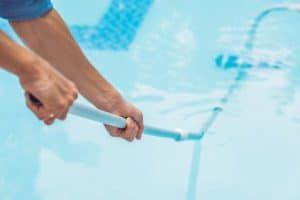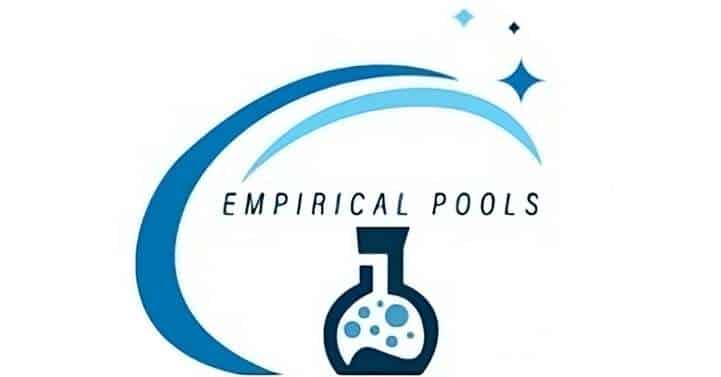Maintaining a sparkling pool requires more than just adding chlorine and skimming debris. Many pool owners unknowingly make common mistakes that can compromise water quality and the overall health of their swimming pool. In this guide, we’ll delve into the top 10 pool cleaning mistakes to avoid, ensuring your pool stays crystal-clear and inviting throughout the swimming season.

1. Neglecting Regular Skimming and Cleaning:
Proper pool maintenance starts with regular skimming and cleaning. Failing to remove leaves, bugs, and debris can lead to water imbalance, clogged filters, and reduced circulation. Make it a habit to skim your pool’s surface at least twice a week and clean out skimmer baskets to promote optimal filtration.
2. Inadequate Chemical Balancing:
Maintaining the right chemical balance is crucial for water quality. Many pool owners make the mistake of adding chemicals without testing, leading to imbalances that can harm both the pool and its swimmers. Invest in a reliable water testing kit and regularly check and adjust the pH, chlorine, and alkalinity levels accordingly.
3. Ignoring Filter Maintenance:
Pool filters play a vital role in trapping impurities and keeping the water clear. However, neglecting filter maintenance is a common mistake. Clean or replace your pool filter as recommended by the manufacturer to ensure it functions efficiently. This simple step can prevent cloudy water and costly repairs.
4. Overlooking Regular Vacuuming:
Even with a pristine-looking surface, the pool floor and walls can harbor debris and algae. Many pool owners underestimate the importance of regular vacuuming. Invest in a quality pool vacuum and establish a consistent schedule to keep the entire pool clean, preventing the buildup of unsightly substances.
5. Overusing Pool Chemicals:
More is not always better when it comes to pool chemicals. Overusing chlorine or other sanitizers can lead to chemical imbalances and skin irritation. Follow recommended dosage guidelines and avoid the temptation to “shock” the pool excessively. A balanced approach will keep the water clean without compromising safety.
6. Neglecting Brushing and Scrubbing:
Algae and other contaminants can attach themselves to pool surfaces, leading to discoloration and a slippery texture. Regular brushing and scrubbing are essential to prevent these issues. Invest in a pool brush suitable for your pool type and make it a part of your weekly maintenance routine.
7. Allowing pH Fluctuations:
Maintaining a stable pH level is crucial for the effectiveness of pool chemicals and the comfort of swimmers. Ignoring pH fluctuations can lead to corrosion, scaling, and inefficient chlorine performance. Use pH stabilizers as needed and monitor levels consistently to avoid potential problems.
8. Failing to Address Leaks Promptly:
A small leak may seem insignificant, but it can lead to significant water and financial loss over time. Ignoring leaks can also affect the pool’s structural integrity. Regularly inspect your pool for any signs of leaks, such as water loss or damp areas around the pool, and address them promptly.
9. Not Covering the Pool When Not in Use:
Leaving your pool uncovered when not in use allows debris, leaves, and insects to find their way in. Invest in a sturdy pool cover to protect your investment and save on cleaning time. Additionally, a cover can help retain heat and reduce evaporation, contributing to energy efficiency.
10. Underestimating Professional Maintenance:
While regular DIY maintenance is crucial, some pool owners make the mistake of underestimating the value of professional pool services. Schedule regular check-ups with a pool professional to detect and address potential issues before they become major problems. Professional maintenance can also extend the lifespan of your pool equipment.
FAQs:
Q1: How often should I clean my pool?
- A1: Skim the pool surface at least twice a week, vacuum weekly, and perform a thorough cleaning, including brushing and scrubbing, once a week.
Q2: Can I use household cleaning products in my pool?
- A2: No, it’s essential to use pool-specific chemicals to maintain the right chemical balance. Household cleaning products can disrupt the pool’s pH and harm swimmers.
Q3: What is the ideal pH level for a swimming pool?
- A3: The ideal pH level for a swimming pool is between 7.2 and 7.8. This range ensures the effectiveness of pool chemicals and provides a comfortable swimming environment.
Q4: How can I prevent algae growth in my pool?
- A4: Regularly brush and scrub the pool surfaces, maintain proper chemical balance, and use algaecides as a preventive measure. Promptly address any signs of algae growth.
Q5: Is it necessary to cover my pool when not in use?
- A5: Yes, covering your pool when not in use is essential to prevent debris, reduce evaporation, and maintain water temperature. It also contributes to overall energy efficiency.
Conclusion:
By avoiding this common pool cleaning mistakes and adopting a proactive maintenance approach, you can enjoy a pristine and inviting swimming pool all season long. Regular cleaning, proper chemical balancing, and addressing issues promptly will not only enhance the aesthetic appeal of your pool but also contribute to a healthier and more enjoyable swimming experience.

